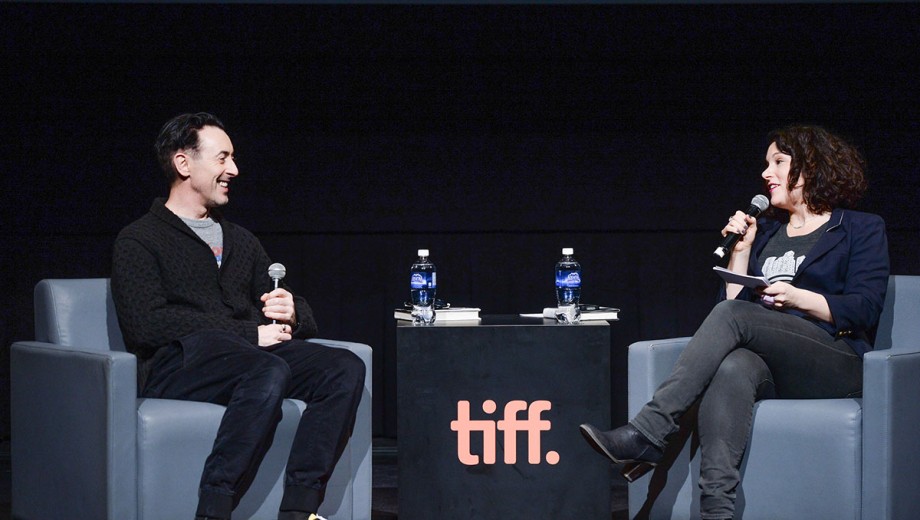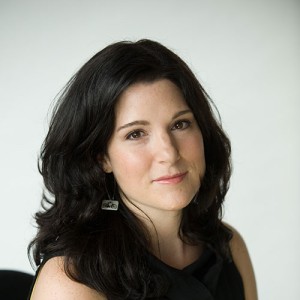Why would you let strangers film the most stressful experience of your life?
Theresa Scandiffio, PhD’08, loves to provoke questions like this. As director of adult learning for the Toronto International Film Festival’s year-round home at the TIFF Bell Lightbox, Scandiffio brings cinema and visual culture to audiences within and beyond academia.
She often matches particular audiences with particular films, so when screening Kings of Pastry—a documentary about a grueling culinary competition—she invited aspiring pastry chefs and would-be documentarians. At the Q&A, one culinary student was aghast that the crew was granted access to such a high-stakes situation. Wouldn’t they get in the way?
In response, director D. A. Pennebaker explained that his crew was restricted to a tiny corner of the kitchen for eight hours. “How in the heck,” an incredulous film student asked, “can you make a film under those conditions?”
Pennebaker put up both his arms, mimed a camera, and said simply: “Like this.”
Scandiffio smiles as she recalls the aftermath of this exchange. “You could see the students thinking about this small gesture,” she says, “and perhaps understanding how crucial hard work and mutual respect are [for creating] a successful project.” Just as documentarians transform real life into art, Scandiffio’s job is to curate moments like these, connecting cinema luminaries with a wider community and facilitating conversations across genres, disciplines, and even different professions. Her approach is informed by her time in the Department of Cinema and Media Studies (CMS), where her dissertation research explored the films displayed alongside exhibitions in the Field Museum of Natural History in the 1920s–30s. As she studied the museum’s holdings in the context of the World’s Fairs and turn-of-the-century presentation culture, she began considering how scholarly work could play out in a public institution instead of a university campus.
UChicago “had a really incredible array of symposia and public-intellectual kind of events, which would bring this huge cinematic energy to the campus—animating it as this playground,” she explains. Yet only a limited number of people could join in the fun. She felt grateful to work with “these very distinct, passionate scholars” as her dissertation advisers, a group that included CMS Professor Jacqueline Stewart, AM’93, PhD’99; Yuri Tsivian, the William H. Colvin Professor of Art History and CMS; and the late Miriam Hansen, the Ferdinand Schevill Distinguished Service Professor in CMS and English Language and Literature. Having watched her mentors recruit students to join “their army of cinephiles, of seeing the world in this delightfully playful and complex way,” she “started thinking about how film can be mobilized to educate audiences, can incite them into social action, can be really energizing and fun.” As the first person in her family to receive a graduate degree, she is eager to replicate her professors’ evangelical spirits on a much larger scale, rendering it accessible outside academia. This populist perspective motivates her current work.
Scandiffio’s purview at TIFF includes a diverse set of programs designed to capture an equally diverse audience. The Kings of Pastry screening was part of Higher Learning, a collaboration with 40 local colleges and universities—including culinary schools. In addition to attending free events and connecting with peers at other institutions, the students, instructors, and film industry professionals who participate have access to TIFF’s film reference library, which Scandiffio also manages. The events cross disciplinary boundaries: a philosopher might lecture to a postproduction class; artists and practitioners might work with theorists.
TIFF’s more public programs are guided by the same principles of interdisciplinarity and collaborative learning. These subscription series cultivate a “very loyal, engaged audience that comes to everything we program,” Scandiffio says. The resulting camaraderie is meant to replicate the experience of a graduate school class: “You make connections, and you cross-pollinate all of these ideas and make something new.” For budding cinephiles interested in joining the cohort, individual tickets are available too.
Public programming is divided into subcategories that showcase the breadth of cinema’s potential: Books on Film (print/screen adaptations), Food on Film (which caters to both “cinephiles and foodies”), and Reel Talk (a Sunday-morning breakfast series where both the film and featured guests are kept secret until the audience arrives). TIFF’s Master Class events feature well-known filmmakers like David Cronenberg, Tim Burton, and Guillermo del Toro—whose “expertise and generosity,” Scandiffio says, reminds her of another dissertation adviser, Tom Gunning, the Edwin A. and Betty L. Bergman Distinguished Service Professor in Cinema and Media Studies and Art History. Both figures exude a spirit of “curiosity and discovery,” she says, and a personal warmth that accompanies their extensive filmmaking knowledge.
Scandiffio, who believes deeply in TIFF’s mission to “transform the way people see the world through film,” loves the discussions that follow these presentations. Given the events’ varied audiences, there’s often a productive tension between different “camps”—some might be curious about a film’s historical background, for example, while others are more interested in the story, and still others want to learn about its real-world implications. But Scandiffio’s guests harness that plurality of perspectives and find educational opportunities within it.
When Orange Is the New Black actress and transgender activist Laverne Cox gave a presentation for TIFF’s “In Conversation with…” series, “the buzz was palpable,” Scandiffio says. The room collectively came to a new understanding of the human rights issues surrounding gender identity and how they could individually contribute to a broader cause. “The impact of that conversation,” she says, “has the power to grow once it spreads from the cinema and into households, offices, political and social movements.”
During her PhD, Scandiffio studied the Soviet filmmaker and theorist Sergei Eisenstein, whose work offers an apt metaphor for her programming ethos at TIFF. “He used to talk about putting firecrackers under the audiences’ seats to get them excited, and I always think of what our guests can do to incite that kind of energy and excitement.” Done correctly, the effects can indeed be transformative. “If it’s learning more about film and visual culture and the appreciation for the arts, amazing,” she says. “But if there also can be a layer of social justice or some kind of political action, then I feel like we’ve really succeeded.”



Comments
Firecrackers in Seats
Thank you for the wonderful article on my daughter Dr. Theresa Scandiffio. Our whole family is proud of her innovative work.